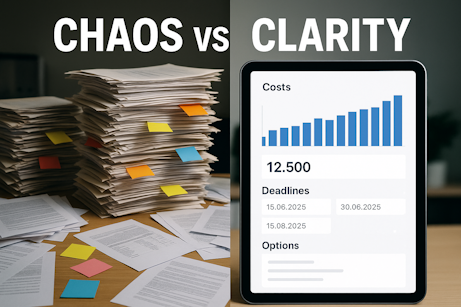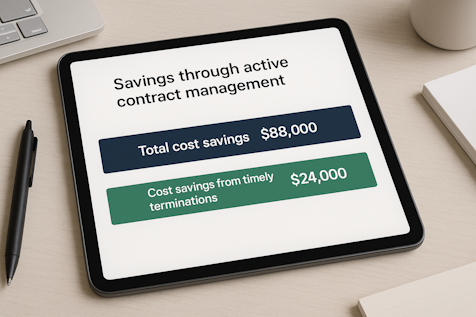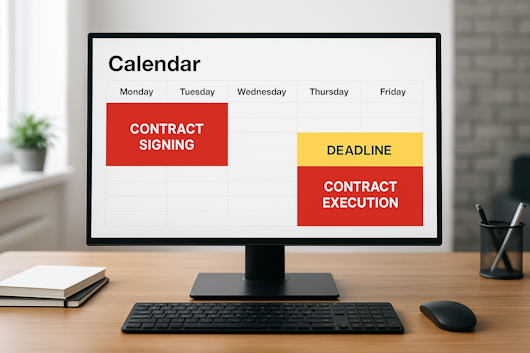 https://samtoa.de/wp-content/uploads/2024/05/Bergsteiger-angeleint_Microsoft-Office.jpg
343
482
Wolfgang Stratenwerth
https://samtoa.de/wp-content/uploads/2020/10/samtoa-license-experts-logo.svg
Wolfgang Stratenwerth2025-09-25 14:10:562024-05-28 14:09:49Converting SAP ECC Licenses to S/4HANA: A Guide for SAP Customers
https://samtoa.de/wp-content/uploads/2024/05/Bergsteiger-angeleint_Microsoft-Office.jpg
343
482
Wolfgang Stratenwerth
https://samtoa.de/wp-content/uploads/2020/10/samtoa-license-experts-logo.svg
Wolfgang Stratenwerth2025-09-25 14:10:562024-05-28 14:09:49Converting SAP ECC Licenses to S/4HANA: A Guide for SAP Customers1. Why Reminders Aren’t Enough
In many companies, the need for a professional contract management service becomes apparent when contract deadlines are still managed through Outlook calendars or Excel spreadsheets that only a few employees can access and hardly anyone maintains properly. This approach might work for small organizations, but beyond a certain size, it becomes risky: deadlines slip through the cracks, responsibilities remain unclear, and ultimately, it costs money.
A real-world example: A reminder was set with only a very narrow window for canceling a software contract. Vacations and absences compounded the issue. The information reached the relevant departments and IT management too late. Result: The contract automatically renewed for twelve months. The company had to continue paying for an expensive license even though the software was no longer being used.
Such cases are not exceptions. Contract management isn’t about keeping track of individual dates—it’s about establishing clean processes, ensuring reliable information, and enabling the right people to make timely decisions.
2. What Must a Good Contract Management Service Deliver?
The crucial factor is whether a service provides genuine value to a company. The foundation lies in complete and structured capture of relevant contract data: terms, costs, cancellation periods, and renewal options.
Only when this data is centrally available and regularly updated does the transparency emerge that’s necessary for informed decision-making.
The results:
- Cost savings through timely cancellations
- Clarity regarding terms, amounts, and contact persons
- Peace of mind instead of hectic scrambling, because deadlines are reliably monitored
Functioning contract management is more than organization—it’s part of corporate security. Neglected contracts pose risks, generate costs, and block decision-making.
3. Typical Contract Management Tasks
In daily operations, contract management manifests primarily in detail-oriented tasks that can easily be overlooked:
- Deadline monitoring: Cancellations and renewals are actively controlled. Reminders are set with clear documentation and arrive on time.
- Document maintenance: Contracts, purchase orders, proposals, and relevant emails are completely stored in the system.
- Regular usage reconciliation: By comparing contract data with actual usage, unnecessary costs can be identified early.
- Preparing results for management: Instead of confusing Excel spreadsheets, information is presented clearly and concisely.
Many projects reveal where things go wrong without proper support: contracts with incomplete attachments, data fields with unclear sources, outdated cancellation periods, or automatically generated reminders without context. Such gaps almost inevitably lead to errors.

4. Roles and Responsibilities
Effective contract management requires clear accountability. Contact persons must be designated and lead times for decisions must be defined. Operational work includes maintaining contract data, monitoring deadlines, and providing relevant information in a timely manner. This keeps responsibility clearly distributed and enables transparent, traceable decision-making.
5. Measurable Benefits
The value of structured contract management shows in concrete results:
- Avoiding automatic renewals saves five- to six-figure amounts
- Better lead times enable well-founded decisions
- Higher data quality ensures cancellation periods are complete and current
- Complete documentation makes contracts audit-proof
Practical examples illustrate the impact. In one case, an automatic renewal was prevented, eliminating substantial licensing costs. In another project, management gained valuable time through systematic deadline monitoring, creating better negotiating positions.
6. Why Contract Management Pays Off
Contract management may appear to be an administrative task at first glance. When properly implemented, however, it delivers significantly more:
- Financially: Cancel on time, save costs
- Security: Improve compliance and audit capability
- Efficiency: Less chaos, clearer processes
- Flexibility: Companies maintain control and can negotiate more confidently
Contract management isn’t a “nice to have”—it’s a management tool. Organizations that actively manage their contracts save money, prevent risks, and create decision-making freedom.

7. Practical Implementation
A functioning process begins with data cleansing. Contracts must be completely available, including all attachments. Only when terms, costs, and cancellation periods are properly recorded is the foundation established. From this point, deadlines can be reliably managed.
This is followed by ongoing operations: monitoring deadlines, setting reminders, regularly updating data. The key is having designated responsible parties. Only then can decisions be prepared in time and implemented reliably.
8. Conclusion
Calendar reminders or scattered Excel lists are insufficient for contract management. The risks are too great, the costs too high. Professional contract management creates clarity and security.
Companies that actively manage their contracts measurably reduce risks and costs. Many of our clients report noticeable relief after just a short time: no more scattered lists, no more forgotten deadlines. Instead, there’s more room for essential tasks.
If you’d like to explore how this could work in your organization, please contact us.
SAMtoa – Your Partner for Contract Management Service.
The Author
Peter Piechota
License Analyst at SAMtoa





 COPYRIGHT Fotos auf Lager von Vecteezy - https://de.vecteezy.com/
COPYRIGHT Fotos auf Lager von Vecteezy - https://de.vecteezy.com/
































